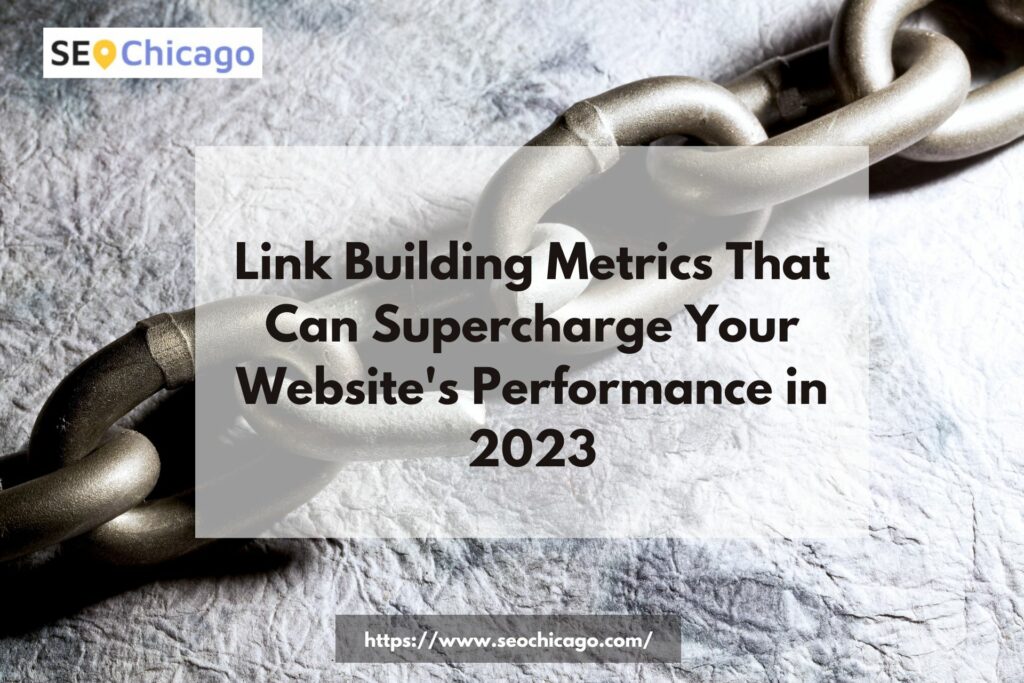In the dynamic world of search engine optimization (SEO), link building continues to play a crucial role in determining the online visibility and authority of a website. As we step into 2023, it becomes imperative to understand the link building metrics that matter and align our strategies accordingly. In this comprehensive guide, we will explore the key factors that can make a significant impact on your link building efforts and ultimately drive organic traffic to your website.
Link Building Metrics That Matter in 2023
To ensure the effectiveness of your link building campaign, you need to focus on several essential metrics. By monitoring and optimizing these metrics, you can strengthen your website’s backlink profile and improve its search engine rankings. Let’s delve into the link building metrics that matter in 2023:
1. Domain Authority
Your website’s domain authority, measured on a scale of 1 to 100, indicates its overall strength and credibility in the eyes of search engines. Higher domain authority leads to increased visibility and better chances of ranking well. Focus on acquiring high-quality backlinks from authoritative websites to enhance your domain authority.
2. Page Authority
Similar to domain authority, page authority reflects the strength of a specific page on your website. It is essential to identify pages with high page authority and prioritize link building efforts towards them. By obtaining quality links to these pages, you can boost their visibility and organic rankings.
3. Trust Flow
Trust flow is a metric that assesses the trustworthiness of a website based on the quality and credibility of its backlinks. Aim to acquire links from trustworthy and reputable websites to improve your website’s trust flow score. This metric holds substantial significance in determining your website’s overall authority and reputation.
4. Citation Flow
Citation flow measures the quantity of backlinks pointing to a particular website or page. While it is crucial to acquire backlinks, it is equally important to ensure that they come from diverse and relevant sources. Strive for a balance between quantity and quality to maintain a healthy citation flow.
5. Link Relevance
Relevance plays a pivotal role in determining the impact of a backlink. Ensure that the websites linking to you are topically relevant to your own content. This helps search engines understand the context and relevance of your website, ultimately influencing your rankings.
6. Anchor Text Diversity
The anchor text used in backlinks can greatly influence how search engines perceive your website. Aim for a diverse range of anchor texts, incorporating both branded and non-branded terms. This strategy provides a natural and organic link profile, mitigating the risk of over-optimization penalties.
7. Link Placement
The position of your backlinks within the linking pages can impact their value and effectiveness. Links placed within the main content of a page tend to hold more weight than those in footers or sidebars. Strive for contextual link placements that provide value to users and improve your chances of ranking higher.
8. Link Velocity
Link velocity refers to the rate at which your website acquires new backlinks over time. It is crucial to maintain a consistent and natural link building pace to avoid raising any red flags with search engines. Sudden spikes or drops in link acquisition can negatively impact your website’s rankings.
9. Social Signals
Social signals, such as likes, shares, and comments on social media platforms, can indirectly impact your link building efforts. While they do not directly contribute to your backlink profile, they can enhance your content’s visibility and attract more natural backlinks. Focus on creating engaging content that resonates with your target audience.
10. User Engagement Metrics
User engagement metrics, including bounce rate, time on page, and click-through rate, provide insights into how users interact with your website. Search engines consider these metrics when assessing the quality and relevance of your content. By optimizing your website for a positive user experience, you can indirectly influence your link building efforts.
Conclusion
In the ever-evolving landscape of SEO, staying updated with the link building metrics that matter in 2023 is essential for driving organic traffic and boosting your website’s ranking. By focusing on domain authority, page authority, trust flow, citation flow, and other key metrics, you can strengthen your link building strategy and improve your website’s visibility in search engine results.
Remember to maintain a balance between quantity and quality when acquiring backlinks, ensure link relevance and diversity, and optimize for user engagement. By implementing these strategies, you can establish a solid foundation for successful link building in 2023 and beyond.
FAQs About Link Building Metrics That Matter in 2023
Q1: How can I improve my domain authority?
A1: To enhance your domain authority, focus on acquiring high-quality backlinks from authoritative websites, create valuable content, and ensure your website is technically optimized.
Q2: What is the ideal balance between quantity and quality of backlinks?
A2: While acquiring a significant number of backlinks is essential, it is equally important to prioritize quality. Aim for a diverse range of high-quality backlinks from relevant and authoritative sources.
Q3: Can I use the same anchor text for all my backlinks?
A3: No, it is important to maintain anchor text diversity to create a natural and organic backlink profile. Use a mix of branded and non-branded anchor texts to avoid over-optimization.
Q4: How do social signals impact link building?
A4: Social signals indirectly influence link building efforts by increasing content visibility and attracting natural backlinks. Engage with your audience on social media and create shareable content to boost social signals.
Q5: What are the user engagement metrics that matter for link building?
A5: Bounce rate, time on page, and click-through rate are important user engagement metrics. Aim to create engaging content and provide a positive user experience to indirectly enhance your link building efforts.
Q6: Is link velocity important for link building?
A6: Yes, maintaining a natural and consistent link velocity is crucial for successful link building. Avoid sudden spikes or drops in link acquisition, as it may raise concerns with search engines.
